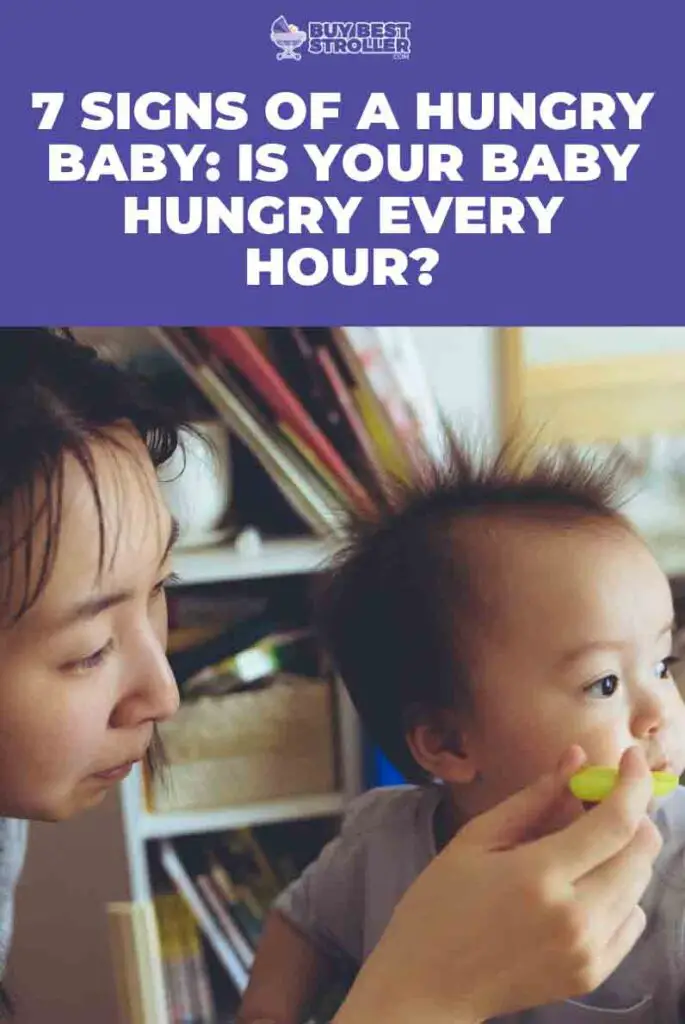7 Signs Of A Hungry Baby :
What Are The Signs Of A Hungry Baby? As a parent, I know many parents struggle with knowing if their baby is hungry or not. You may have some questions regarding feeding, such as “What are the common signs of a hungry baby?”, “Why does a baby feed more at night than during the day?”, and so on.
Even though newborns cannot yet talk, they give us some cues about their needs.
7 Signs Of A Hungry Baby:
1. Restlessness
Fidgeting or stirring may indicate hunger in a baby. A baby is much more likely to be awake and active if they think about food.
2. Opening Mouth
It is a sign of hunger when a baby keeps opening and closing his or her mouth.
3. Licking The lips
When a baby licks or suckles her lips or tongue, it’s a sign that the baby needs to be fed.
4. Hand In Mouth
When you notice that your baby is constantly putting his or her fist or fingers in his or her mouth. It means the baby is hungry.
5. Rooting
Signals like this are pretty strong and recognizable. A baby who is rooting will turn his or her head from side to side seeking a food source. Further, they will open their mouths and they will grab at anything they can see on their faces.
6. Crying
According to the American Academy of Pediatrics, crying is a late sign of hunger. When a baby shows earlier hunger cues and starts crying, it is important to calm the baby and feed him/her as soon as possible.

7. Physical Agitation
The physical signal will appear wild and uncontrolled. A baby who is very hungry may flail arms and legs, squirm, and thrash about.
Baby Won’t Wake Up To Eat, What You Should Know!
It’s okay not to wake them up just to feed them if it has been a reasonable amount of time if you are confident they are alright. If you notice your baby has not been gaining weight, you need to find out why they are not waking up to eat.
During the first two weeks of life, your baby does not eat after sleeping for five hours, you might need to wake up and feed them. You do this so they can gain weight gradually.
If your baby does not wake up to eat, you need to try a bit more forcefully with your nudges. You can also sing or talk a little more loudly to wake him or her. And remove his clothes completely, or you can also move the baby to a different room because a change of venue can sometimes be a helpful change.
When none of these methods work, let him sleep for another hour or so, then try again to wake him up. When he does not eat after two missed feedings, you should check with your pediatrician. Most likely, everything will be fine, but you might need extra assistance from your doctor or lactation consultant to put you and your baby back on an appropriate feeding schedule.
Reasons: Baby Feeding Every Hour And Not Sleeping
The process when your baby takes lots of small feeds every hour is called cluster feeding. Cluster feeding is perfectly normal during the first few days and months of breastfeeding.
There are a few possible reasons cluster feeding may occur:
1. Growth Spurts
During growth spurts, babies’ bodies need more nourishment. They need more calories and nutrients than normal. As a result, they need to eat much more frequently.
2. Increased Milk Supply
Cluster feeding increases milk production in the breasts. Your body produces more milk in response to your babies feeding more. Therefore, some moms use cluster feeding to increase milk production.
3. Developmental Milestones
During their first six months, babies experience a range of developmental milestones. During this time, they require more nourishment and feeding helps them self-soothe. Since feeding is comforting, babies may seek it out more during these times.
4. Helps Baby Sleep Better
As they sleep for a long time after a full feed, cluster feeding facilitates a better sleep cycle.
The most common time for cluster feeding is toward the end of the afternoon or in the early evening. However, it may happen at any time of the day. After cluster feeding, babies may sleep longer.
Cluster feeding stimulates a mother’s breast to produce more milk. Growing babies may cluster feed in order to consume more nutrients during growth spurts. It generally stops after babies reach 6 months of age.
Are your Newborn Acts Hungry But Just Ate?
In cases where your baby acts hungry even if they have eaten recently, feed them. But don’t force them to feed on the breast or bottle if they refuse. If you can, try a different soothing activity – and feed them again after a half-hour or an hour.
You should mix and match methods to find out what works for you and your baby since calming strategies don’t always work. You can try the following suggestions:
- Add a layer of clothing if they are cold; remove a layer if they are hot
- Providing a less stimulating environment (for example, turning off the TV, dimming the lights)
- Giving them fresh air
- Bathing them,
- Keeping them in your arms
- Gently rocking them
- Strolling them (or carrying them)
Even if your baby doesn’t calm down, check for possible signs of illness, such as a fever or stuffy nose. You should contact your doctor if you suspect your child is sick, especially if they have a fever.
Is Your Baby Feeding More At Night Than Day? Know Why!
A baby feeds more at night than during the day, this is a process known as reverse cycling. When a newborn is born, their days and nights may be mixed up, causing them to reverse cycles. During the day, distracted babies and toddlers may miss or shorten their nursing sessions, so they tend to feed more at night.
When the mom is very busy or distracted during the day, the baby may feed more at night to make up for missed nursing sessions or to get uninterrupted time with her.
In the middle of the day, toddlers who are constantly on the go may not feed well. It is sometimes seen as a sign of weaning. Breastfeeding of the child in the evenings and during night can help prevent weaning before both mother and baby are ready.




